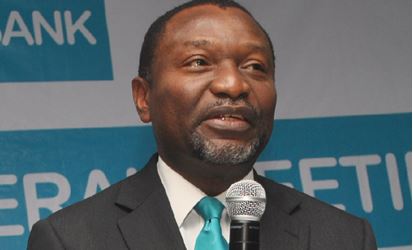News
We Have Moved 10 Million Nigerians Out Of Poverty – FG
Minister of Budget and National Planning, Sen. Udoma Udo Udoma claims the administration of President Buhari has moved millions of Nigeria out of poverty.
The federal government has boasted that it has moved 10.073 million Nigerians from poverty to prosperity.
The minister of Budget and National Planning, Sen. Udoma Udo Udoma made the claim Tuesday while speaking on arrangements for the 24th Nigerian Economic Summit (NES#24) held at the conference room of the ministry in Abuja.

He said federal government had taken steps to move over 10 million Nigerians from poverty to prosperity as one of the key priorities of the Economic Recovery and Growth Plan, ERGP by investing in the people.
According to him, the government had provided 8.96 million school children under the Home Grown School Feeding Programme; over 297,000 poor and vulnerable Nigerians supported with cash transfer of N5,000; successfully disbursed more than 308,000 loans of N50,000 and above under the Government Enterprise and Empowerment Programme (GEEP) and 200,000 Young Unemployed Graduates Empowered through the N-Power scheme , while over 308,000 had been selected for consideration for the second batch.
‘‘We have taken steps towards moving our people from Poverty to prosperity. Indeed, one of the key priorities of the ERGP is investing in our people.
‘‘That objective has been behind many Government programmes, particularly the Social Investment Programme. Under this programme, we have empowered millions of Nigerian youths, women and children.
‘‘To combat hunger and achieve food security, we have raised capital provisions for agriculture from N8.8billion in 2015 to N149.2billion in the 2018 budget. Over N82billion has been disbursed as credit to more than 350,000 farmers under the Anchor Borrowers’ programme. 14 moribund fertilizer blending plants have been revitalized through the Presidential Fertilizer Initiative (PFI), with a total capacity of 2.3million metric tons of NPK fertilizer.
‘‘Nigeria’s milled rice production has increased by about 60% and since 2016 eight new rice mills have been brought into production,’’ he added. The chairman and CEO of NESG, Mr. Laoye Jaiyeola in his opening remarks, explained that the summit scheduled to hold from October 22-23, 2018 in Abuja with the theme ‘‘Poverty to Prosperity: Making Governance & Institutions Work’’, would focus on using governance to lift Nigerians out of poverty.
He assured that the summit would continue to be rallying point for both public and private sectors to various economic challenges plaguing the country. According to the minister, the focus of the summit will be on good governance as a path to sustainable human and economic development in order to achieve the goals of the ERGP. On the reason for low GDP growth in the country, he blamed it on insecurity and low oil production and assured that effort was on to meet the growth target.
‘‘We are aware of the fact that the GDP growth in the last quarter was below the estimated target. This is because of the growing insecurity and low oil production but we are working hard to meet our growth target.
‘‘It is important to note that the non-oil sector has been growing. That is why we have been working harder to be where we want to be. We will also work harder on agriculture to address hunger and food insecurity in the country.
‘‘We can’t do everything together. Agriculture was part of last year’s theme. This year is on governance. The ERGP runs on 2020 not focused on election.’’
The Nigerian Economic Summit is organised annually by the Nigerian Economic Summit Group (NESG) in collaboration with the Federal Government of Nigeria represented by the Ministry of Budget and National Planning.
The summit provides a forum for dialogue amongst top policy makers and corporate leaders. It brings together government officials, representatives of the private sector, development partners, the civil society and some members of academia to reflect on issues constraining our national development with the aim of building consensus so as to evolve common strategies and policy frameworks for addressing these issues.
Follow us on social media:-

 Economy2 days ago
Economy2 days agoGoods worth millions of naira destroyed as fire guts spare parts market in Ibadan
-

 Celebrity Gossip & Gist1 day ago
Celebrity Gossip & Gist1 day agoMoment stage collapses on Odumodublvck during concert performance (Video)
-

 Economy1 day ago
Economy1 day agoPresident Tinubu cancels Lagos engagements in honor of food stampede victims
-

 Celebrity Gossip & Gist1 day ago
Celebrity Gossip & Gist1 day ago“The quality of a woman isn’t measured by the hair on her head but by her brain” – Yul Edochie cautions ladies against killing themselves over expensive hair this Christmas

